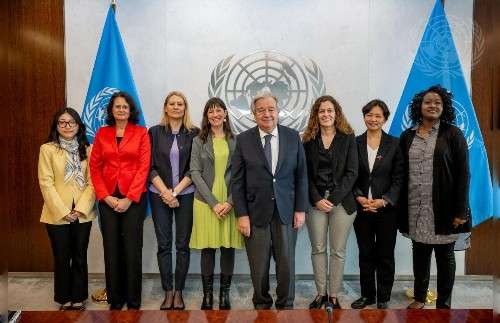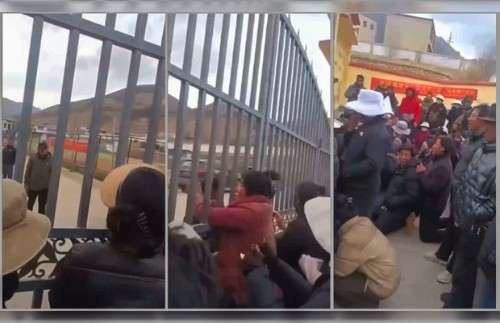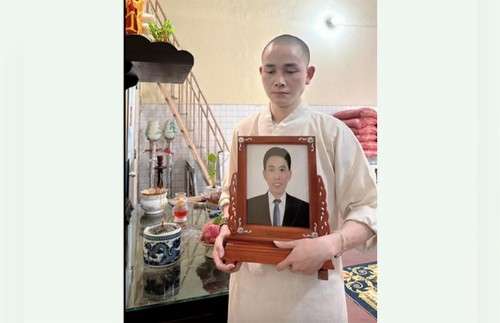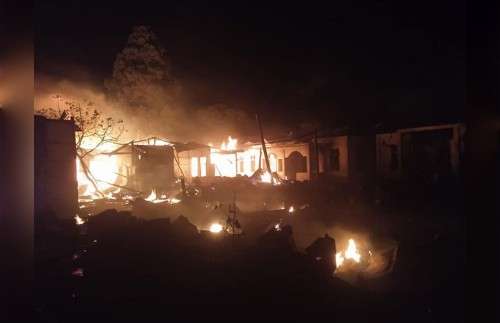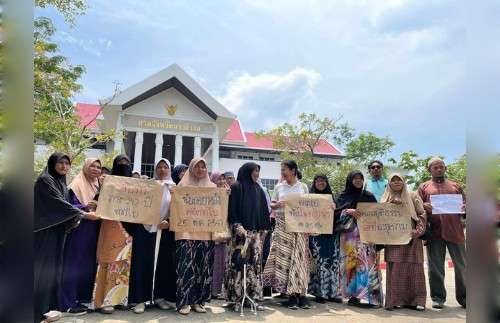Journalist Andrea Hoffmann discusses the book she co-wrote with Uyghur camp survivor Mihrigul Tursun.

Mihrigul Tursun, 31, has spoken publicly about the violence and torture she and other Uyghurs suffered while interned in China’s vast network of “re-education” camps in the country’s far-western Xinjiang region. She has been denounced by the Chinese government, which produced a short documentary in which Mihrigul’s parents, police officers and doctors all speak against her, and tries to portray her testimonies as false. Mihrigul has co-written a book titled Ort ohne Wiederkehr (Place without Return) with German investigative journalist Andrea Hoffmann about China’s atrocities against the Muslim minority group. The nearly 300-page book released in January describes how Mihrigul was imprisoned several times in detention camps, during which time one of her three young children died. She has lived in exile in Washington, D.C. since 2018.
Co-author Hoffmann, who worked for several years as a foreign correspondent for Germany’s Focus Magazine, was shocked when she learned about what is happening to the Uyghurs in Xinjiang and teamed up with Mihrigul to tell her story. The professor of investigative journalism at the Hamburg University of Applied Sciences in Hamburg, Germany, has reported from the Middle East, Africa, and Latin America, and has written other books about women who fight for their freedom. Hoffmann spoke to reporter Gulchehra Hoja of RFA’s Uyghur Service about why she and Mihrigul wrote the book — the first publication by a Uyghur internment camp survivor — and what she hopes it will accomplish. The interview has been edited for length and clarity.
RFA: Why did you write this book?
Hoffmann: I had a big focus on the Middle East, and I wrote a lot of stories about the Middle East and recently about the Islamic State and what it did to people. And then, I heard about the Uyghurs, but I didn’t know too much about them. I was working as a journalist in the foreign department of a big magazine and saw it. Occasionally, I just heard more and more, and I became curious about what was actually happening, because I heard about those [re-]education camps and imagined them being like schools. And then, some information was gripping, so that’s why I became interested. I made the contact with the Uyghurs in Germany and interviewed them. When I learned more, I thought it would really be interesting to talk to someone who could talk about what was happening in the camps. We had one woman here, but it was the same story. They all have to be careful. And then, they established contact with Mihrigul because she at that time was the only one that was really willing to tell it all. I had just a superficial knowledge about the camps, but when I was talking with her, I was so shocked.
RFA: Mihrigul experienced physical and psychological violence in the camps. What shocked you most after hearing her story?
Hoffmann: I have a sweet spot for people who are suppressed. I hate it when people get into situations where force is applied, when they are treated unfairly, and there seems to be no escape. There are millions who have no escape. It’s a miracle that she could escape. It’s a complete miracle. And all the others, they are in this situation without any fault [of their own], and it makes me so angry. There’s no justification for putting anybody in a situation like that. Then, I heard that all those women were in one room day and night. They didn’t even have a place to sleep, and not enough food; this propaganda all the time, then the fights. People were dying because it was so hard on their bodies and minds. I had this vision of her being in that room all the time. I don’t know how you cannot go crazy in a situation like that. She just had newborn babies that were just six weeks old. I cannot imagine how terrible that must have felt for her body because she was still breastfeeding them, and then also for them. One of them has died. The situation is so terrible. I think you doubt being a human being, and your life is so fragile that you cannot do anything about it against this force from outside. You feel so weak.
RFA: What was the most horrible thing Mihrigul told you about her life outside the camps and the situation that other Uyghurs faced?
Hoffmann: When she told me about those people [Chinese] living in the family homes, it was so terrible. It’s a nightmare. It’s a complete nightmare.
RFA: You are an investigative journalist who has written books about courageous women who fight for their freedom. How is this book different from those?
Hoffmann: The difference is that it is a state committing the crime. Even with the Islamic State, it wasn’t really a state, but a terrorist organization. But this time it’s a state, and that’s the big difference. It’s really shocking. In Xinjiang, it’s any random person who might seem suspect. She [Mihrigul] didn’t do anything. When I talked to her, I thought that maybe she had [participated in] some kind of political activity, but the fact is that everybody there is subject to this harassment and brainwashing. It’s really a dimension that I could not grasp before. It reminded me of German history. Many, many Uyghurs are afraid to speak right now because what they are all afraid of what will happen to their family members there. She [Mihrigul] took this step. I think it’s because of her son, because she feels an obligation.
RFA: What’ your vision for the book?
Hoffmann: I really hope it will make an impact. My aim was really to give her a stronger voice, so I hope she will be heard. We had a very good start now in the German parliament the day before yesterday with one politician who has a strong focus on human rights watch, and there were 60 journalists present, so it’s becoming a topic in Germany. Also, Germany is an important player in this [issue] right now because it is the most important economy in Europe. Germany plays an important role now because we’re still very mild with China on account of having a lot of economic interest there. So now, this discussion in Germany is very important. I think because it is about the position of Europe in this conflict. I really have to think about German history all the time. With what happened to the Jews in Germany, it was the same story. There were some survivors, very few survivors, and they talked, but nobody believed them. Foreign countries were [considering whether] they should act or not act, and they were very slow. The same thing is happening now. In Germany, we have our own issues. We have this doctrine that one should never compare anything to the Holocaust, but I do because I think it’s very comparable because it is also a systematic killing of people.
RFA: What’s the significance of releasing the book just before the 2022 Beijing Winter Olympics?
Hoffmann: I wasn’t really conscious of that. I just knew we had to get it out very soon, but it’s the perfect timing right now, just three weeks before [they begin].
RFA: Why is German release of this book significant?
Hoffmann: Germany is quite important right now because Europe has to make a decision about whether or not to work with China. It really depends on public opinion where Germany will be going in this regard. Germany has a big influence on Europe because we have the biggest country in Europe, so that’s the important thing about the German release. Of course, I hope it will be available in English because that way it can be distributed everywhere in the world, and everybody will be able to read it.
RFA: How important is this book for Mihrigul Tursun?
Hoffmann: I have a little bit of a background with working with traumatized people because I also studied psychology and did a bit of research. She will never get rid of this. It’s part of her story, and those memories will always be with her. But she might be able to integrate them more, so that it would help her to accept what happened. She might be willing to move on, and that will also give her some more self-esteem. She’s incredibly strong.
RFA: Are you concerned about facing challenges or threats from China for documenting Mihrigul’s story?
Hoffmann: When I imagine what happened to her, I think that I should not be afraid of anything. It’s really important to write everything down — everything that’s happening there right now.
Reported by Gulchehra Hoja for RFA’s Uyghur Service. Written in English by Roseanne Gerin.
Copyright © 1998-2020, RFA. Used with the permission of Radio Free Asia, 2025 M St. NW, Suite 300, Washington DC 20036. https://www.rfa.org. For any








